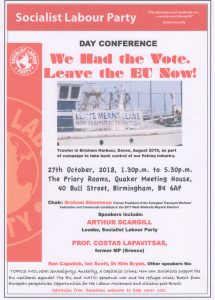In it is difficult to make sense of the underlying reasons why nearly £17.5 million of us in Britain voted against staying in the European Union. Reasons given are those from the small elite group who have found globalisation of markets have worked in their favour. The missing agenda is the debate about why a significant proportion of leave voters were motivated to do so. The kind of suppositions put about include voters are uneducated and/or they are racist and xenophobic.Time for an open post-Brexit including the missing agenda is long overdue.
Costas Lapavitsas, Professor of Economics at SOAS, University of London, and former member of the Greek Parliament in 2015, describes in more detail the characteristics of the voters on both sides in a description of two rifts, minor and major, among the elite and in wider society. He says “according to the Ashcroft poll 64% of the C2, D and E categories (i.e. class classifications) voted for Brexit; these are basically skilled and unskilled manual workers, casual workers, those who depend on the welfare state for their income and so on.” This is followed by a detailed breakdown area by area. Lapavitsas article “Why They Left” articulates how the confusion arises in his description of a “minor rift” between leavers and remainers in the “British ruling class” and a “major rift” in the wider society.
Another Greek commentator, Takis Fotopoulos, has written about “The Systematic Effort of the Transnational Elite to Crush the ‘Brexit Revolution’.” He states that “the apparent collapse of the ‘Brexit revolution’ far from reflecting the feelings of the victims of globalisation, which, if anything, gets stronger all the time, it simply reflections the vicious attacks of the elites against any political expression that the Brexit revolution has taken….either in the UK, the USA or France. Therefore through suppression nd mostly deception, they may have successfully temporarily succeeded in suppressing the growing anger of the victims of globalisation.” He notes that the left, associated with “societies’ victims, has clearly changed sides in the globalisation era…..”
A closer look at the voting figures, while 17,410,742 voted to leave the EU, UKIP secured 4,376,635 votes in the 2015 general election (falling to 594,068 in 2017). This leaves in excess of 13,000,000 whose views and motives are unknown and untested. While rhetoric at Westminster repeatedly states the imperative of honouring the result of the referendum, in fact they and their reasons for voting thus have gone missing, absent without leave. Those who determined the outcome are being deliberately ignored.
Recent events have brought the current situation into star focus in the wake of the visit of the US President, Donald Trump. It had appeared that many of those active in the referendum campaigned had melted away, but there they were associating themselves with individuals and groups even further to the right than they had appeared earlier. Steve Bannon, a one time associate of Donald Trump, closely involved in his election, came to Europe. Both Bannon and Trump recommended Boris Johnson as next PM! (Bannon’s activities were not confined to the UK it should be noted. He consorted with some far right leaders including Austria, Hungary and Italy.) Significantly he was interviewed by Nigel Farage. “Tommy Robinson” the jailed English Defence League leader was discussed and hailed in glowing terms by Bannon as “the ‘backbone’ of England”. A prominent Union Leader, member of RMT, Steve Hedley, was injured in a vicious attack by his supporters taking part in a violent demonstration on behalf of the EDL.
It was Tony Benn who asserted that “The EU has the only constitution in the world committed to capitalism. It destroys the prospects of socialism anywhere in Europe, making capitalism a constitutional requirement of that set up.” He and others were campaigning against the EU in 1975, including Arthur Scargill and Jeremy Corbyn. It was repeated when the Maastricht Treaty defined the so-called “four freedoms” underlying the way the European Union would proceed. If it wasn’t clear then it is abundantly so now in the light of experience. “Freedoms” referred to free trade allowing powerful organisations to move their operations around in order to make use of the cheapest labour available. For individuals it has been a different matter in their experience as they have lost jobs and communities have been devastated. These are the victims of what is termed variously as “globalisation” and “neo-liberalism”. When we look to see where these areas are they coincide with poverty and deprivation, exacerbated by the effects of austerity and privatisation of “essential services”. Immigration was proclaimed a key factor, but those communities are often characterised by their now highly diverse communities who have for many years exhibited solidarity in working class issues.
Neoliberalism itself has been the subject of considerable discussion while its world-wide progress shows little sign of abating. “Neoliberalism: the Idea that Swallowed the World” ….(18/8/17) ”the reigning ideology…that venerates the market and strips away the things that make us human.”; “Neoliberalism has brought out the worst in us” (19/8/17) and “Neoliberalism-the ideology at the root of all our problems” (19/8/17) are articles on the subject, all published in the Guardian in the space of a couple days last summer, seem to have made little impact, including on the Guardian itself still supporting the rearguard action to remain. Likewise the Independent and Mirror. For me the article that sums it up was printed in an International Monetary Fund paper in June 2016 which lays bare its inhuman origin. In the article headed “Neoliberalism Oversold?” it is stated:
“Milton Friedman in 1982 hailed Chile and an “economic miracle.” Nearly a decade earlier, Chile had turned to policies that have since been widely emulated across the globe. The neoliberal agenda – a label used more by critics than by the architects of the policies – rests on two main planks. The first is increased competition- achieved by deregulation and the opening up of domestic markets, including financial markets, to foreign competition. The second is a smaller role for the state, achieved through privatisation and limits the ability of governments to run fiscal deficits and accumulate debt.”
While the authors note some excesses, including “increased inequality” they maintain “there is much to cheer about in the neoliberal agenda”. Maybe for the few benefitting from the finance sector and its ability to print money, but certainly not the majority who depend on producing goods and getting well-paid, dependable employment for their existence.
What is staggering is the labour movements’ ambivalence to staying in or leaving the EU given the existence of publications which demonstrate repeatedly that the EU is repressing workers through dictatorial orders, orders which so many “democratic” leaders are impatient to impose like President Macron in France. A report of a seminar held by the Institute of Employment Rights last summer brought together delegates from across Europe to the Marx Library. The report is crucial at this time in showing what opportunities Brexit bring for Trades Unions and Socialists, yet it is difficult to find even in the Institute’s publication list. It points, for instance, to the experience of Norway, a member of of the single market but not the EU. Even then in 2016 EU-based law overturned a hard won union fight to decide on dock labour by giving away the rights to a shipping company when they contested it!
Seen like this many more than the number who voted to leave the EU are victims of globalisation. Access to key services and maintenance of quality affects health, education, housing, transport, justice has been severely weakened for those without the means to pay up with massive cuts and lower standards from privatised suppliers paying lower wages to their staff. They are characteristically under huge pressure to meet excessive demand, health and safety standards have fallen sharply while at the same time the bosses of companies, some of which are multinational, multitasking, get huge returns. Profits are likely to be outsourced and tax paying avoided.
Governments in Brussels and Westminster operate under similar characteristics with a burgeoning system of patronage from powerful lobby groups. The difference Tony Benn reminds us concerns democracy. We directly elect MPs to Westminster and have a direct link. With Brussels this is not the case, and MEPs have little say in policies dreamed up by bureaucrats. There is therefore a strong possibility that a significant number voted to leave so as not to surrender British sovereignty. For the Left EU rules would disallow the possibility of voting for governments seeking to introduce Socialist policies.
There are a number of other possible serious reasons why people voted against the EU given its current rightward drift.
A very strong reason for rejecting the EU is its adherence to austerity and policies of privatisation of services particularly by victims of globalisation who have lost essential services, had benefits slashed ending in homelessness, depending on food banks and so on. Their vulnerability was exploited by the right putting the blame on scapegoats once again.
The EU, in line with their masters, big business, reduce costs and make cuts at every opportunity leaving individuals with low paid and unstable employment through ploys like zero hour contracts. Maybe quite a few of the leave voters considered enough is enough as union powers were seriously curtailed. Collective bargaining was a major target. Where was the left leadership when it was needed when the union leadership widely fell in with the remain campaign telling workers that their rights were protected by the EU. While there may have been some truth in this once upon a time the financial crash saw to it that it was the banks and financial institutions that needed available funds. Social democracy has traditionally seen a need to compromise and co-operate with a “cuddly” Capitalism. It is now abundantly clear that Capitalism shows no wish to compromise in its aim for maximum profit. Public funds intended for health, education, criminal justice have been handed over to private concerns with catastrophic results affecting the great majority of people. Those who realised this from the beginning would have voted to leave the EU.
NATO has been a matter of concern for some years as it has been involved with conflict continuously both inside and outside Europe. Its actions led to large displacements of people many of whom sought refuge in countries of Europe through bombing campaigns. Europe’s armaments industries have been selling to regimes noted for their abuses of human rights.
If the term “Brexit” has negative connotations in the UK, this is not the case across European countries and globally. The same agenda is missing elsewhere and many are looking to the UK for a lead in removing the burden of exploitation in this new manifestation of colonialism. In Europe many countries have become impoverished by being saddled with a currency, the Euro, over which they have no control. This is having disastrous effects particularly on people particularly those denied a voice.
Greece has recently faced devastating wild fires near to Athens. Commentators are pointing directly at the effects of Brussels’ control with 4,000 fire fighters lost through cut backs demanded by the EU. To add insult the Greek government supports 14 privatised airports providing them with hundreds of firefighters! Have you guessed, the private owners are a group based in Germany? Under the EU it is becoming quite usual for profit to go out of the country so the possibility of updating equipment is lost. (in the UK railways are being run by foreign owners, including German, French and Dutch state railways. They have taken substantial profits from the UK while providing terrible services and compromising safety, including removing guards from trains.)
Further examples of the situation across Europe can be found in the Institute of Employment Rights’ publication “Europe, the EU and Britain: Workers’ Rights and Economic Democracy.” The conference was held at the Marx Memorial Library on 1st July, 2017. Mauricio Miguel from Portugal spoke about the 1972 left wing takeover of government now seriously compromised by EU diktat and law. He says”
“I would like to emphasise how much we value the outcome of the British referendum for what it represents and contributes to the struggle of the Portuguese workers and people in terms of respect for their sovereignty, their right economic development and social progress, and against the unacceptable impositions and constraints of the European Union and Euro.”
The Socialist Labour Party are among those calling for a conference to be held in Birmingham this autumn inviting Arthur Scargill and Costas Lapavitsas as key speakers.
 Trawler in Brixham Harbour where members of the fishing industry are cmapigning to leave the EU
Trawler in Brixham Harbour where members of the fishing industry are cmapigning to leave the EU

